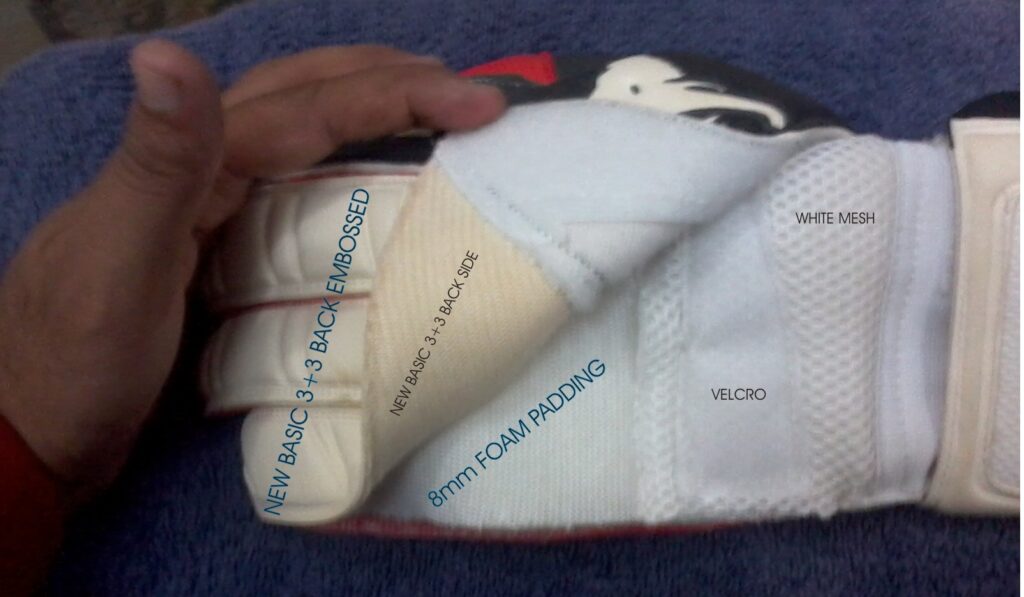- Know that gloves Are perishable: The reality is; the more expensive the glove, the better the grip but the less the glove lasts. Super Soft and the stickier latex palms found in professional grade gloves provide exceptional grip but not much in durability. Very tacky game gloves with a lot of grip will start showing signs of wear or even start “flaking” during the first use. It is not a quality issue it is because the latex is soft. Buying a glove with more durability will be at the expense of some grip. A glove designed for games will last on average 12 –14 games before they have to be converted to the practice ranks. Some keepers get more than a season but that depends on how well the keeper cares for the gloves, their diving technique, the amount of stress the gloves are under, and playing surface. You have to find a balance based on your budget.
- Buy the Correct Size: If gloves are too big or small it not only can affect your performance but also accelerates the wear and tear of the gloves. Fingers that are in gloves that are too big or small can put stress on the latex and the seams causing premature breakdown or tears. When sizing your gloves, your fingers should be no less than a ¼ inch to an ideal ½ inch. An inch or more is too much.
- Know your palm latex: Purchase a glove based on your playing conditions and budget. Know whether your glove and latex is best suited for all weather, dry conditions, wet conditions. Soft tacky professional grade latex palms that are used for “All Weather” or “dry weather” should be moist while playing. A wet weather glove requires care and soaking pre match and potentially at half time. A Super Soft tacky glove will breakdown on harsh indoor surfaces and hard ground. The better the latex, the more expensive, the better the grip but the sacrifice is durability. Gloves with better durability sacrifice some amount of grip.
- Care for the gloves during the match: With softer latex gloves you need to moisten the palm again with water as it dries. Spit only goes so far. Super Soft latex palms can become slippery when wet. Figure out the correct balance before your match to avoid wearing sponges when you need the gripping power the most.
- Use training gloves: To insure your game gloves are in the best shape possible don’t practice with them. Buy a relatively inexpensive training glove that can take the beating of training. Once your game gloves start to show considerable signs of wear relegate them to the practice field and purchase a new pair. It is important to have 1 pair strictly for matches and another for training.
- Clean your gloves: Dirt and sweat breakdown the latex of the glove. Dirt acts as sandpaper and dries the soft, tacky, porous latex into a hard crusty surface. The toxins in your sweat also can dry out the glove over time. Rinsing the gloves after a game will help wash the spit, sweat, and dirt away.
- How to clean – Wash your gloves with luke-warm water. Gently squeeze excess water out. Wringing can tear the seam. A mild detergent can be used to help with the smell and really dirty jobs but it is not necessary. Reusch makes a detergent that is designed for sensitive latex but the merit of adding a detergent to something that you want to be tacky is a great debate. I STRONGLY discourage the use of a detergent of any type. Hang dry. NEVER Ever, Ever accelerate the drying process with dryers, the sun, or dehumidifiers. Don’t keep in a sunny car to bake either. All the above will take the natural moisture out of the gloves causing them to be dry and brittle.
- Store them properly: After a game don’t throw your gloves in a bag and forget about them until the next game. If your next game is tomorrow then wipe the dirt of the palm with a moist glove towel. Washing them for tomorrow’s game may cause the gloves to be too wet. If that is the case, wrap the gloves in a moist glove towel to keep them moist for tomorrow’s game. You don’t want your gloves drying with the dirt and sweat in the palm. Over time dirt and sweat will absorb the natural moisture of the causing the glove to dry, crack, and peel. Don’t store your gloves more than a day wet since the will stink and begin to grow fungi. When storing your gloves don’t place them with palms together since they can stick together and rip when trying to separate. A glove bag is the best way to store your gloves. The latex needs to breath.
There is a lot to the inside of a goalkeepers glove but at the end of the day it’s all pretty much foam and mesh.

